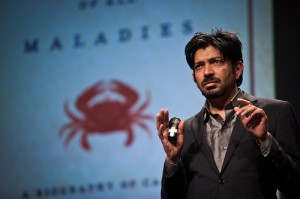 Following up on Dr. H. Gilbert Welch’s comments on the new blood test for cancer – that overdiagnosis may lead to an epidemic of individuals who mistakenly believe they have cancer – here’s a description of the climate that’s created when we try to scare people into believing they have cancer. It’s from a review of The Emperor of All Maladies
Following up on Dr. H. Gilbert Welch’s comments on the new blood test for cancer – that overdiagnosis may lead to an epidemic of individuals who mistakenly believe they have cancer – here’s a description of the climate that’s created when we try to scare people into believing they have cancer. It’s from a review of The Emperor of All Maladies, a new book on the history of cancer by Siddhartha Mukherjee.
Writing in The New Yorker, the author of the article, Steve Shapin, explains optimism surrounding the drug Gleevec, a new type of cancer drug that targets a known cancer gene. Gleevec has been quite successful in the treatment of leukemia. (emphasis added)
What will the cancer world of the near future look like? …
Perhaps it will indeed be a long-hoped-for state in which cancer becomes just another chronic disease. … But what of those who have not been diagnosed with cancer? The fortunate patient taking Gleevec forever constitutes only one of two new kinds of being in the modern cancer world; it’s also populated by legions of the screened and the tested, who become more and more aware of the dangers battering away at their cells from the external environment and lurking inside, encoded in their genes. This is the world of the cancer “risk factor”: of the Pap smear; the annual mammogram; the prostate-specific antigen test; the colonoscopy; the wait for the results of biopsies of polyps removed in the colonoscopy; the daily dose of Prilosec taken because frequent heartburn is thought to be a risk factor for esophageal cancer; even the world of knowing one’s personal genome and the world of the prophylactic mastectomy.
The risk-factor world holds out hope for avoiding cancer while recruiting masses of us into the anxious state of the “precancerous.” The physician and historian Robert Aronowitz offers an acute illustration of the problem: a fifty-eight-year-old woman diagnosed with breast cancer has a lumpectomy, followed by local radiation and months of chemo. After that, she is put on the anti-estrogen Tamoxifen for five years. As she finishes that course of treatment, she weighs the decision whether to go on a different type of hormonal therapy and what type and frequency of M.R.I. or mammogram to get. She is an active member of a breast-cancer-survivor group, and she closely monitors the latest developments on the Web. Meanwhile, another woman, the same age, has not received a breast-cancer diagnosis. She has, however, taken supplementary estrogen pills for several years in connection with menopause, and her doctor now tells her to stop, because estrogen may constitute a risk factor for breast cancer. She has been getting annual mammograms since she was forty, and four years ago an abnormal mammogram was the occasion for an aspiration biopsy. This proved negative, but her anxiety increases. She surfs the Web for information about risk factors, and she is struck by direct advertisements for Tamoxifen to prevent the development of breast cancer, for which she now believes she is at serious risk. The first woman had cancer; the second woman does not have cancer. But their experiences eerily resemble each other. …
A world in which cancer is normalized as a manageable chronic condition would be a wonderful thing, but a risk-factor world in which we all think of ourselves as precancerous would not. It might decrease the incidence of some forms of malignancy while hugely increasing the numbers of healthy people under medical treatment. It would be a strange victory in which the price to be paid for checking the spread of cancer through the body is its uncontrolled spread through the culture.
Related posts:
Screening for cancer and overdiagnosis
The downside of overly aggressive cancer screening
The last well person
“I” Is for Innocent: Health obsession in fiction
Resources:
Image: Pop! Tech
Steven Shapin, Cancer World, The making of a modern disease, The New Yorker, November 8, 2010
Siddhartha Mukherjee, The Emperor of All Maladies: A Biography of Cancer


Sorry, comments are closed for this post.